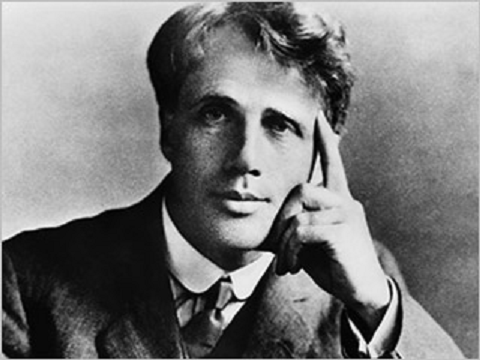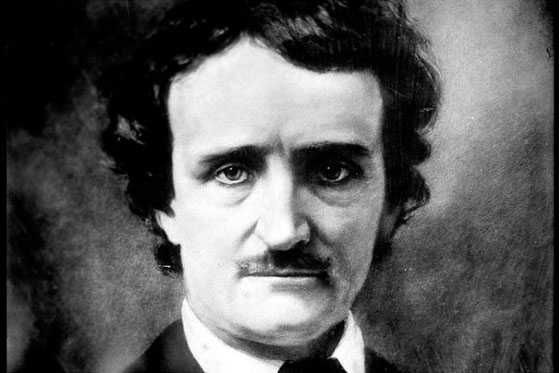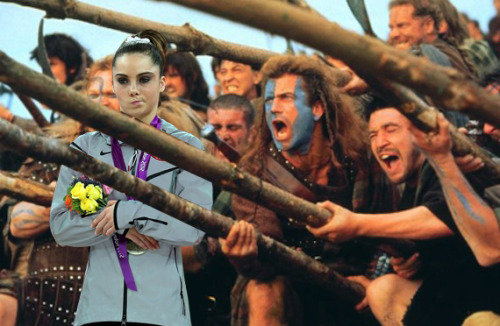Another short one today, How about giving 7 and a half minutes to Edgar Allen Poe’s “The Tell Tale Heart?”
Showing posts with label Edgar Allen Poe. Show all posts
Showing posts with label Edgar Allen Poe. Show all posts
Friday, April 26, 2013
Feature Film Friday
Another short one today, How about giving 7 and a half minutes to Edgar Allen Poe’s “The Tell Tale Heart?”
Wednesday, April 17, 2013
What They Were Reading: Robert Frost
On
the Fiftieth Anniversary of Robert Frost’s death, the Christian Science
Monitor has dug up an old Top 10 list that he provided to the Massachusetts
Library Association in 1934. Below are his ten all-time favorite books, and here is the
article with relevant quotes and explanations:
- The Odyssey, by Homer
- Robinson Crusoe, by Daniel Defoe
- Walden, by Henry David Thoreau
- The Tales of Edgar Allen Poe, by
- The Oxford Book of Verse
- Modern American and British Poetry
- Last of the Mohicans, by James Fennimore Cooper
- The Prisoner of Zenda, by Anthony Hope
- The Jungle Book, by Rudyard Kipling
- Essays and Poems by Ralph Waldo Emerson
Labels:
Anthony Hope,
Daniel Defoe,
Edgar Allen Poe,
Henry David Thoreau,
Homer,
James Fenimore Cooper,
Kipling,
Ralph Waldo Emerson,
Robert Frost,
What they were reading
Tuesday, December 18, 2012
Review: The Narrative of Arthur Gordon Pym, by Edgar Allen Poe
Edgar
Allen Poe only wrote one full-length novel. The modern reader may not hear much
about it anymore, but that doesn’t mean it wasn’t plenty influential in its
day. Baudelaire translated it into French and riffed on it in some of his own
poetry. Jules Verne is said to have greatly admired the book, even penning what
can only be called a “fan-fiction” sequel called An Antarctic Mystery . Henry James alluded to the book in The Golden Bowl and Jorge Luis Borges praised it as Poe’s
greatest work. Moby Dick may have drawn pretty heavily on parts of it, and readers
of Life of Pi (or viewers of the gorgeous new movie by the
same name) may not even realize that the tiger’s name, Richard Parker, is an
homage to Poe’s only novel.
Having
said all that, I can’t remember a book I’ve read in the past couple years whose
ending was so unworthy of its beginning. In reality, it’s kind of impossible to
give Pym a fair reading in this day and age. In the
latter half of the book Poe was postulating about the completely unknown world
of the Antarctic- something even casual modern readers know quite a bit about
nowadays. For this reason, the whole last half of the book fell flat for me.
But the beginning was something else!
This
book started out promising intrigue and adventure, and did a great job
delivering on both counts. Our narrator is secreted away in the inaccessible lower
decks of a ship by his friend, the nephew of the captain. They agree that they
need to wait a certain period of time before exposing their stowaway plan, so
that it becomes impractical to turn back to port. But when the prearranged
period comes and goes with no word at all from the friend, Pym is left in his
stuffy hellhole of a hiding place, having exhausted his supplies of food or
drink and having no clue what’s going on above deck. As the narrator plays out
his mental and physical suffering, we’re treated to some classic Poe-ian angst,
every bit as good as the suffering in the “Tell-tale Heart.”
From
there the story leaps into a classic adventure tale, filled with mutiny, violent
sea storms, starvation, cannibalism and finally, rescue.
And
here’s where I wish I had put the book down. The survivors are rescued by a
boat en route to the Antarctic for the purpose of exploration. (Keep in mind,
no one knew of Antarctica when Poe put his story down on paper.) But what
follows is page after page of sleep-inducing, faux-scientific detail about the flora
and fauna on various islands in the southern seas. Seriously, by the time
you’ve used the word “declivity” for the sixth or seventh time, I think it’s
safe to say your story has come off the rails.
Their
discoveries include a black-skinned, black-teethed race of men, and some fifteen
foot long relative of the polar bear. The crew is eventually slaughtered by
this strange native people, all except for Pym and another man, who continue
south in a dinghy into mysterious, milky-white seas where a giant magical figure
appears out of nowhere and brings the book to a close.
Really,
that’s how it ends. I guess if I had picked up the book when it was published
in 1838, and the Antarctic region was still as unknown to Poe’s readers as some
distant planets are to us, it might have fared a little better in my judgment.
As it is, though, I can only say that Poe started out strong, then put me to
sleep, then woke me up and repeatedly jumped the proverbial shark.
Thursday, December 6, 2012
Writers in the Lonely Hearts Club
Remember that time when Edgar Allen Poe, Aldous Huxley, Dylan
Thomas, Terry Southern, William S. Burroughs, H.G. Wells, Oscar Wilde, Stephen Crane, George Bernard Shaw, Lewis Carroll and T.E.
Lawrence all got to together with a few friends and held a giant photoshoot?
Yeah, well, the project that gave birth to that motley gathering
kicked off forty six years ago today. Above is the shot that finally landed on the Beatles’ Sgt. Pepper’s album cover. Can you find the
writers named above? No? Me neither. (I could only find five without the help of a key.) But see below for all the writerly call-outs:
Labels:
Dylan Thomas,
Edgar Allen Poe,
George Bernard Shaw,
H.G. Wells,
Huxley,
Lewis Carroll,
Oscar Wilde,
Stephen Crane,
T.E. Lawrence,
Terry Southern,
William S. Burroughs
Thursday, August 16, 2012
The movie was good, but the poem was better...
So here’s an interesting topic: Movies based on poems.
Yes, they exist. It seems they are few and far between, but a little digging reveals a few prime examples. Of course most that spring to mind live in the epic poem category, but I’m going to go ahead and disqualify those right at the outset. An epic poem is, for all intents and purposes, basically a book. And a book-length work, regardless of its rhyme and meter, ought to contain more than enough plot to fill out a feature film.
So, while they may be great movies, don’t give me your Troy (the Iliad), your Beowulf (Beowulf), your El Cid (Cantar de Mio Cid) or your Braveheart (The Actes and Deidis of the Illustre and Vallyeant Campioun Schir William Wallace). Neither McKayla nor I am impressed.
Also, spare me the modern retellings like “O, Brother Where Art Thou” (the Oddysey) and the biopics like “Howl” (“Howl.”)- both of which are already disqualified based on length above.
No, I’m talking about relatively short poems, that spin complete yarns, and that have inspired some hungry screenwriter to create movie magic. Here are a few that fit the bill:
“The Man From Snowy River,” based on the 1890 poem of the same name, by Australian poet Banjo Paterson. The climax of the poem became the climax of the film- Jim Craig’s lunatic plunge down that impossibly steep gorge on horseback was seared into my five-year-old brain like few movie moments have been before or since.
“Gunga Din,” based on the 1892 poem of the same name, by Nobel Laureate Rudyard Kipling. This one’s a “loosely-based,” but the theme of the brave and decent native as compared to the craven British soldiers is true to the original.
“The Raven,” based on the 1845 poem of the same name, by drunkard and all-around wierdo Edgar Allen Poe. I haven’t seen this one, so I don’t know how loyal it is to Poe, but it’s a B movie horror-comedy. What more could you really want?
“Mulan,” based on “The Ballad of Mulan” a Chinese poem transcribed in the 6th century. I haven’t read this one, and haven’t seen the movie. But I did read the Chick-Fil-A kids meal version to my kids a year or so ago. Does that count?Which ones did I leave out, readers and movie buffs? What other short poems have made their way to the silver screen?
Labels:
Banjo Paterson,
Edgar Allen Poe,
Films,
Kipling,
Poetry
Subscribe to:
Comments (Atom)







